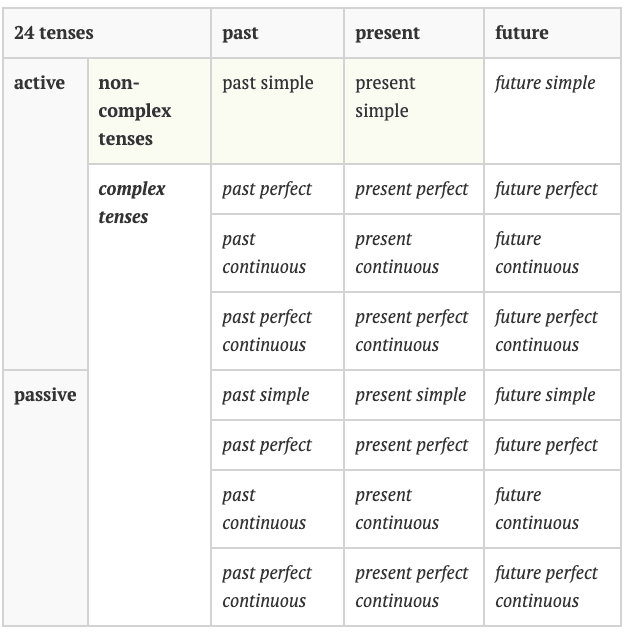Sorted – The English tenses and aspects you should learn
I tend to emphasise a lexical approach to language learning. In other words, I prefer my students to learn words and collocations, as well as to create personalised sentences using newly-learned words and phrases. However, my grammar-hungry students occasionally remind me that I shouldn’t totally overlook grammar and the most important tenses. Hence, this post highlights the English tenses and aspects you should learn due to their frequency of use in everyday speech. I’ll go through what aspects are later, but in a few words, they are different versions, or reflections, of a tense. For example, when we say the “present simple”, the “simple” part is an aspect of the “present” tense.
All about English tenses
If you ask a teacher or learner of English to name all of the English tenses, they will most likely come up with a list which looks like this:
- present simple
- present continuous
- present perfect
- present perfect continuous
- past simple
- past continuous
- past perfect
- past perfect continuous
- future simple
- future perfect
- future continuous
- future perfect continuous
Undoubtedly, such a list can be very handy when it comes to sequencing language points that we want to teach or learn. A number of course books also deal with English tenses in this way.
The majority of ESL websites state that there are twelve English tenses. Where does the number twelve come from? According to some linguists and teachers, there are three main verb tenses: present, past and future. They divide the present, past and future verb tenses into four kinds (or aspects): the simple, continuous, perfect and perfect continuous. Hence, three (verb tenses) multiplied by four (aspects) equals twelve “tenses”. Technically, then, there are not 12 verb tenses but 12 distinct verb forms.
Some grammar-hungry maniacs claim that there are thirteen tenses because the future may be expressed with going + infinitive.
When I saw the following table of 24 tenses, I almost fell off my chair:

We tend to refer to the passive voice as opposed to passive tenses. Essentially, the passive voice denotes interest in the person or object that experiences an action rather than the person or object that performs the action.
How many tenses are there in English?
Old English had only TWO tenses in English - present and past.
This may not be a very helpful answer for English language learners due to the sheer number of distinct verb forms and aspects they may feel compelled to master.
Nevertheless, English grammarians tend to refer to TWO morphological tenses. The present and past tenses may be expressed in a single word, by adding a suffix. For example, we add -ed to walk to make the past simple form walked. There is a twist in the tail coming up though.
Declerck (2006, p.24) argues the following:
there is no a priori reason for assuming that tense can only be expressed morphologically, and not also by the use of auxiliaries … tense forms other than the present tense and the past tense are all complex tense forms. In a complex tense form the first auxiliary (the operator) is morphologically in the present or past tense.
On the basis of Declerck’s views, the tense auxiliary which functions as the operator may be either have or will. Both can appear in their present or past tense form. In other words, we have will and would, and have and had.
I don’t want to get too bogged down here with conditional tenses (would) and conditional perfect tenses (would have). Instead, I’m merely pointing out that there are grammarians out there who do, in the present day, believe in the existence of the future tense (will) and four tenses involving a form of have which can be grouped together as perfect tenses.
Overall, the debate is open as to how many tenses there are in English. English language learners should perhaps just accept that there are 12 main aspects of the two main tenses in English - past and present.
Is there a future tense in English?
You may also be asking yourself why there’s a debate at all regarding whether there is a future verb tense in English. Some linguists’ doubts surface from the notion that references to the future require a helping modal verb, such as will or might. Technically, then, will, in “I will play a few songs for you”, does not promote a separate tense in itself because it's only a reflection, or aspect, of the present tense.
We tend to express the future in English using will or going to, both of which play the role of helping verbs. Therefore, we don’t make any changes to the form of the main verb. The form of play, as in I will play, never changes. All of this means that the manner in which we express the future does not satisfy the definition of a morphological tense.
There is another point regarding the ways in which we refer to the future. Consider the following two examples:
- That will be John at the door right now
- I’’m going right now
It can be seen from these two utterances that the way in which we may refer to the future are not necessarily exclusive to the future time period.
Finally, it is quite common to use the present tense (both the simple and continuous forms) to express the future:
- The bus leaves at 7 p.m.
- We’re meeting tomorrow at midday
Which tenses and aspects should you prioritise?
For the purposes of this post, the English tenses and aspects you should learn are those which I believe proficient speakers of English use most often when interacting with others.
Around 95% of your interactions will be in the following tenses:- present simple
- present perfect
- present perfect continuous
- past simple
My experience and logic inform me that it's a huge waste of time to focus on the future perfect, the future continuous and the future perfect continuous. It’s mind-boggling just how many teachers get their students to study such obscure and pointless aspects of the English grammar system.
When you think about it, it’s very rare in normal conversation to have to use the future perfect: “By this time next month, I will have lived in Poland for two years.” You’re far more likely to use the present perfect continuous to emphasise how long you’ve been living in a place: "I've been living in Poland for two years."
It’s the same old nonsense with the future continuous tense: “This time next month, I’ll be travelling around Italy.” Ok, you might say something like that when you’re really looking forward to something or are in a dreamy mood. However, it's still very rare to utter something in such a way in a conversation.
Finally, I did wonder about adding the future simple to my list of important tenses. Native speakers use this tense all the time:
I think I’ll have another biscuit.
Don’t worry John, I’ll take you to the airport on Saturday.
Nevertheless, as the future simple is often used for the unplanned future, and in conjunction with making spontaneous decisions, I selected the four tenses above because of their role when it comes to building and continuing conversation, and talking about life experiences.
The Present Continuous
The present continuous tense is not one of those tenses which is often used in an informal conversation. After all, while having a beer with a friend in a pub, you’re not very likely to start talking about what you’re doing at the present moment, are you? “Oh, John, I’m drinking a beer at the moment! And you?”
When it comes to things that are happening around the time of speaking, the present continuous tense may come in handy: “I’m working on a big project at the moment”. But even then, many proficiency speakers of English may choose to use the present perfect continuous to link what’s been going on recently, with situations that are still current ("going on") in the present time:
I’ve been working on a big project lately
PERSONALISE THE MOST COMMON TENSES AND ASPECTS
I’ve banged on about personalising words, phrases and grammar items a lot on this site.
When it comes to mastering aspects such as the present perfect, the answer is not to complete countless gap-fill exercises in grammar workbooks. You should focus on creating as many personalised sentences (i.e. sentences which are true about yourself) as you can which contain a target grammar structure. Such a method enables you to make an emotional connection with that grammar item.
My personalised sentences for the present perfect:
- I’ve never been to Switzerland but I’d like to go
- I’ve been to Berlin three times
- I’ve taught English in five countries - Serbia, Bosnia, Ukraine, Poland and the UK
Alternatively, you could write true stories to practise the most common English tenses and aspects. This would allow you to combine aspects such as the present perfect and past simple:
Question: Have you been to America?
Answer: Yes, I have. In 2008, I went on a six-week camping tour around the entire country. I visited cities like New Orleans, Chicago and Los Angeles and famous National Parks, such as the Grand Canyon and Yellowstone.
SUMMING UP - THE ENGLISH TENSES AND ASPECTS YOU SHOULD LEARN
My advice to students of English is not to panic about the English grammar system. In reality, there are not many English tenses and aspects you need to learn for the sake of expressing yourself correctly in informal everyday speech. Throw the future perfect aspect out of the window and start writing stories detailing your life experiences using the present perfect and past simple. Write stories about your daily habits using the present simple. The English tenses and aspects you need to learn are those which enable you to build meaningful conversations with people.
All in all, focus on the essentials - and don't forget to personalise.



